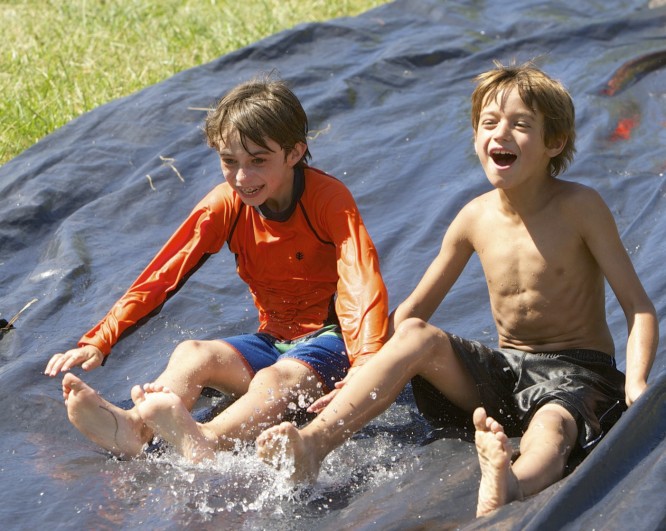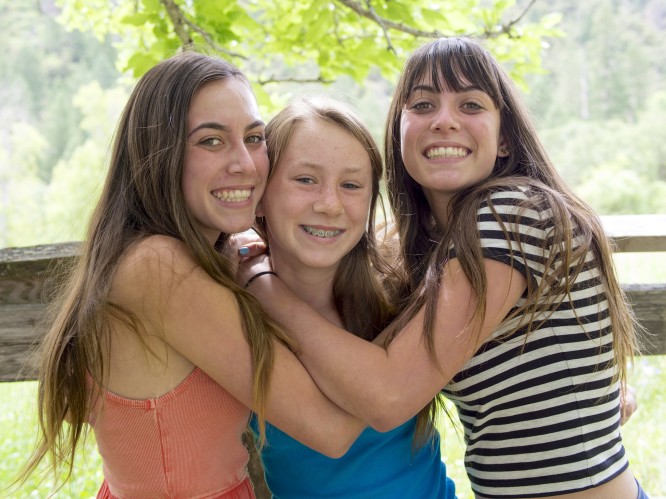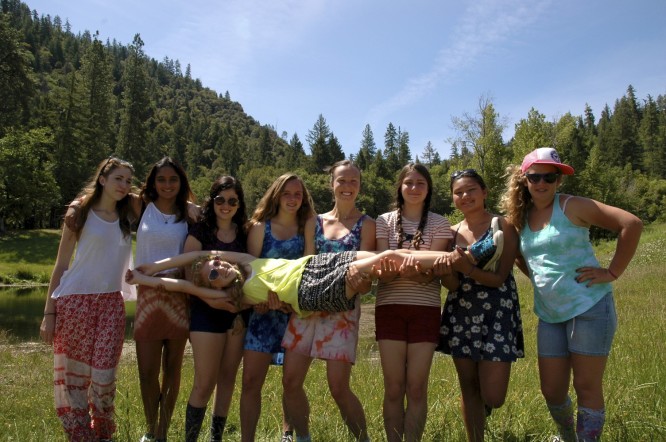During the summer of 2014, Bar 717 Ranch took part in a study led by Audrey Monke, Director of Gold Arrow Camp. Audrey’s research was aimed at discovering what impact summer camp has on child happiness and social skill development. Feedback from our campers was included in Audrey’s study, and we are thrilled to share her findings with you! The blog post below was written by Audrey Monke and was originally shared on her blog, Sunshine Parenting.
“Camp is basically my happy place, and I love being here more than any other place in the world.” – Camper, 2014
 “Happy camper” is an expression used to describe anyone who’s feeling good about something in any circumstance. But just how happy are actual campers who attend overnight summer camp? Last summer, Bar 717 Ranch participated in research that included over 3,000 campers at seven different residential summer camps, that set out to answer that very question.
“Happy camper” is an expression used to describe anyone who’s feeling good about something in any circumstance. But just how happy are actual campers who attend overnight summer camp? Last summer, Bar 717 Ranch participated in research that included over 3,000 campers at seven different residential summer camps, that set out to answer that very question.
When campers completed their normal end-of-camp survey (used by camps to get feedback about the experience), additional questions in 2014 asked about happiness. From those, 80% of campers reported that their camp experience made them happier, with 31% of kids saying they felt “a little happier” because of camp and 49% saying they felt “a lot happier”. Here are a few of their comments:
“It was the best time of my life.”
“It’s one of my favorite places on Earth.”
“Camp is the most fun I have all year.”
“I had so much fun and everybody was nice to me.”
“Camp is a fun and happy place.”
“Camp is a really fun environment where I can learn and have fun, make friends, and grow as a person.”
“I get to play with my friends.”
“I have been here for five years and 99% of the time I’m happy (except for arrival and packing day).”
“Camp makes me feel happy.”
“The counselors are super funny.”
“Camp is an amazing place with no worries.”
“I enjoy the safe, active, friendly atmosphere.”
“Camp is very fun and sometimes I miss my family, but most of the time I feel at home.”
“It is very good to get away from technology and meet new adventures.”
“Camp is so much fun and has better things to do than be a couch potato.”
“I get to do activities I don’t get to do at home.”
“At home, I am bored most of the time. At camp, I am never bored.”
 We also asked campers to tell us how they felt emotionally while at camp, and 86% of them reported feeling happy “most of the time” or “more of the time than sad,” compared to 70% who felt those same levels of happiness when they were not at camp. In fact, 2,032 (62%) of the 3,197 campers who answered the question said they felt happy “most of the time” at camp, compared to 1,334 (41%) who said they felt happy “most of the time” when they were not at camp.
We also asked campers to tell us how they felt emotionally while at camp, and 86% of them reported feeling happy “most of the time” or “more of the time than sad,” compared to 70% who felt those same levels of happiness when they were not at camp. In fact, 2,032 (62%) of the 3,197 campers who answered the question said they felt happy “most of the time” at camp, compared to 1,334 (41%) who said they felt happy “most of the time” when they were not at camp.
Finally, when asked what they liked about camp and why they wanted to return, 1,047 campers mentioned the word “fun,” and 635 mentioned the word “friend.”
Campers often describe camp as their “happy place” or “the best two weeks” of their year. And, from observation, anyone can see that kids and the counselors who work with them appear happy at camp. They smile a lot. They look relaxed. There’s a lot of laughter. So many fun things happen at camp every day that it’s no surprise it’s such a happy place for kids. Now, our findings have proven that the anecdotal stories are true and that most kids are, in fact, happier at camp.
 So why is that the case? While that research has yet to be done, other research in the field of positive psychology may hold the answer. Martin Seligman—the father of positive psychology and a major figure in the wellbeing movement—has identified five areas that lead to the condition he calls “flourishing,” encapsulated in the acronym PERMA: positive emotion, engagement, relationships, meaning, and achievement. PERMA critics say there are few places where all five can be found together, but in the context of our study, camp is one such place. In short, camp may be just the positive intervention some kids need to flourish!
So why is that the case? While that research has yet to be done, other research in the field of positive psychology may hold the answer. Martin Seligman—the father of positive psychology and a major figure in the wellbeing movement—has identified five areas that lead to the condition he calls “flourishing,” encapsulated in the acronym PERMA: positive emotion, engagement, relationships, meaning, and achievement. PERMA critics say there are few places where all five can be found together, but in the context of our study, camp is one such place. In short, camp may be just the positive intervention some kids need to flourish!
So go ahead and use the term “happy camper” to refer to people who are happy and flourishing, because kids at camp are, indeed, “happy campers”!

